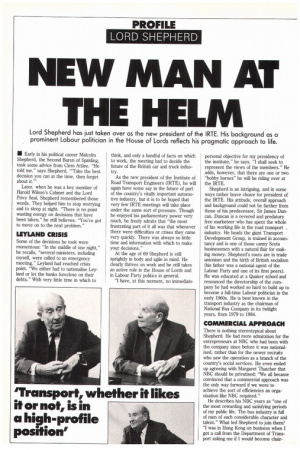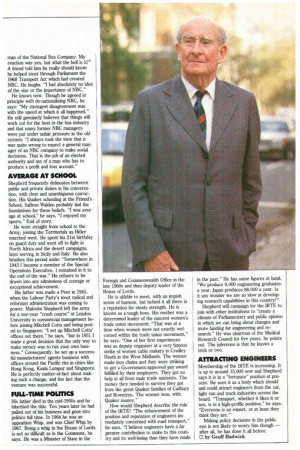NEW MAN AT THE HELM
Page 42

Page 43

If you've noticed an error in this article please click here to report it so we can fix it.
Lord Shepherd has just taken over as the new president of the IRTE. His background as a prominent Labour politician in the House of Lords reflects his pragmatic approach to life.
• Early in his political career Malcolm Shepherd, the Second Baron of Spalding, took some advice from Clem Attlee. "He told me," says Shepherd, "Take the best decision you can at the time, then forget about it.'" Later, when he was a key member of Harold Wilson's Cabinet and the Lord Privy Seal, Shepherd remembered those words. They helped him to stop worrying and to sleep at night. "There is no point wasting energy on decisions that have been taken," he still believes. "You've got to move on to the next problem."
LEYLAND CRISIS
Some of the decisions he took were momentous: "In the middle of one night," he recalls, "several ministers, including myself, were called to an emergency meeting." Leyland had reached crisis point. "We either had to nationalise Leyland or let the banks foreclose on their debts." With very little time in which to think, and only a handful of facts on which to work, the meeting had to decide the future of the British car and truck industry.
As the new president of the Institute of Road Transport Engineers (IRTE), he will again have some say in the future of part of the country's vitally important automotive industry, but it is to be hoped that very few IRTE meetings will take place under the same sort of pressure. Though he enjoyed his parliamentary power very much, he freely admits that "the most frustrating part of it all was that whenever there were difficulties or crises they came very quickly. There was always so little time and information with which to make your decisions."
At the age of 69 Shepherd is still sprightly in body and agile in mind. He clearly thrives on work and he still takes an active role in the House of Lords and in Labour Party politics in general.
"I have, at this moment, no immediate personal objective for my presidency of the institute," he says. "I shall seek to represent the views of the members." He adds, however, that there are one or two "hobby horses" he will be riding over at the IRTE.
Shepherd is an intriguing, and in some ways rather brave choice for president of the IRTE. His attitude, overall approach and background could not be further from those of his predecessor, Sir James Duncan. Duncan is a revered and predatory free marketeer who has spent the whole of his working life in the road transport , industry. He heads the giant Transport Development Group, is trained in accountancy and is one of those canny Scots businessmen with a natural flair for making money. Shepherd's roots are in trade unionism and the birth of British socialism (his father was a national agent of the Labour Party and one of its first peers). He was educated at a Quaker school and renounced the directorship of the company he had worked so hard to build up to become a full-time Labour politician in the early 1960s. He is best known in the transport industry as the chairman of National Bus Company in its twilight years, from 1979 to 1984.
COMMERCIAL APPROACH
There is nothing stereotypical about Shepherd. He had more admiration for the entrepreneurs at NBC who had been with the company since before it was nationalised, rather than for the newer recruits who saw the operation as a branch of the country's social services. He even ended up agreeing with Margaret Thatcher that NBC should be privatised: "We all became convinced that a commercial approach was the only way forward if we were to achieve the sort of efficiencies an organisation like NBC required."
He describes his NBC years as "one of the most rewarding and satisfying periods of my public life. The bus industry is full of men of such considerable character and talent." What led Shepherd to join them? "I was in Hong Kong on business when I got a call from the Department of Transport asking me if I would become chair man of the National Bus Company. My reaction was yes, but what the hell is it?" A friend told him he really should know: he helped steer through Parliament the 1968 Transport Act which had created NBC. He laughs. "I had absolutely no idea of the size or the importance of NBC."
He knows now. Though he agreed in principle with de-nationalising NBC, he says: "My strongest disagreement was with the speed at which it all happened." He still genuinely believes that things will work out for the best in the bus industry and that many former NBC managers were put under unfair pressure in the old system: "I always took the view that it was quite wrong to expect a general manager of an NBC company to make social decisions. That is the job of an elected authority and not of a man who has to produce a profit and loss account."
AVERAGE AT SCHOOL
Shepherd frequently delineates between public and private duties in his conversation, with clear and unambiguous conviction. His Quaker schooling at the Friend's School, Saffron Walden probably laid the foundations for these beliefs. "I was average at school," he says. "I enjoyed my sports." End of story.
He went straight from school to the Army, joining the Territorials as Hitler marched west. He spent his 21st birthday on guard duty and went off to fight in North Africa and the desert campaigns, later serving in Sicily and Italy. He also brushes this period aside: "Somewhere in 1943 I became a member of the Special Operations Executive. I remained in it to the end of the war." He refuses to be drawn into any admissions of courage or exceptional achievement.
His father was made a Peer in 1945, when the Labour Party's most radical and reformist administration was coming to power. Malcolm Shepherd left the army for a one-year "crash course" at London University in commercial management before joining Mitchell Cotts and being posted to Singapore: "I set up Mitchell Cotts' offices out there," he says, "but in 1951 I made a great decision that the only way to make money was to run your own business." Consequently, he set up a successful manufacturers' agents business with offices around the Pacific rim in cities like Hong Kong, Kuala Lumpur and Singapore. He is perfectly matter-of-fact about making such a change, and the fact that the venture was successful.
FULL-TIME POLITICS
His father died in the mid-1950s and he inherited the title. Ten years later he had pulled out of his business and gone into politics full time. In 1964 he was an opposition Whip, and was Chief Whip by 1967. Being a whip in the House of Lords is not so difficult as in the Commons, he says. He was a Minister of State in the Foreign and Commonwealth Office in the late 1960s and then deputy leader of the House of Lords.
He is affable to meet, with an impish sense of humour, but behind it all there is a reputation for steely strength. He is known as a tough boss. His mother was a determined leader of the nascent women's trade union movement: 'That was at a time when women were not exactly welcomed within the trade union movement," he says. "One of her first experiences was as deputy organiser at a very famous strike of women cable makers in Cradley Heath in the West Midlands. The women made iron chains and they were striking to get a Government-approved pay award fulfilled by their employers. They got no help at all from male trade unionists. The money they needed to survive they got from the great Quaker families of Cadbury and Rowntree. The women won, with Quaker money."
How would Shepherd describe the role of the IRTE? "The enhancement of the position and reputation of engineers immediately concerned with road transport," he says. "I believe engineers have a far greater contribution to make to this country and its well-being than they have made
in the past." He has some figures at hand. "We produce 9,000 engineering graduates a year. Japan produces 88,000 a year. Is it any wonder we are so slow at developing research capabilities in this country?"
Shepherd will campaign for the IRTE to join with other institutions to "create a climate of Parliamentary and public opinion in which we can bring about changes and more funding for engineering and research." He was chairman of the Medical Research Council for five years, he points out. The inference is that he knows a trick or two.
AlTRACTING ENGINEERS
Membership of the IRTE is increasing. It is up to around 15,000 now and Shepherd says it is in a "fortunate" position at present. He sees it as a body which should and could attract engineers from the car, light van and truck industries across the board. "Transport, whether it likes it or not, is in a high-profile position," he says. "Everyone is an expert, or at least they think they are."
Making policy decisions in the public eye is not likely to worry him though — after all, he has done it all before. 0 by Geoff Hadwick








































































































































